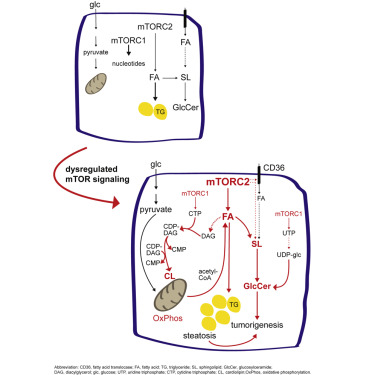当前位置:
X-MOL 学术
›
Cancer Cell
›
论文详情
Our official English website, www.x-mol.net, welcomes your feedback! (Note: you will need to create a separate account there.)
mTORC2 Promotes Tumorigenesis via Lipid Synthesis.
Cancer Cell ( IF 50.3 ) Pub Date : 2017-Dec-11 , DOI: 10.1016/j.ccell.2017.11.011 Yakir Guri 1 , Marco Colombi 1 , Eva Dazert 1 , Sravanth K Hindupur 1 , Jason Roszik 2 , Suzette Moes 1 , Paul Jenoe 1 , Markus H Heim 3 , Isabelle Riezman 4 , Howard Riezman 4 , Michael N Hall 1
Cancer Cell ( IF 50.3 ) Pub Date : 2017-Dec-11 , DOI: 10.1016/j.ccell.2017.11.011 Yakir Guri 1 , Marco Colombi 1 , Eva Dazert 1 , Sravanth K Hindupur 1 , Jason Roszik 2 , Suzette Moes 1 , Paul Jenoe 1 , Markus H Heim 3 , Isabelle Riezman 4 , Howard Riezman 4 , Michael N Hall 1
Affiliation

|
Dysregulated mammalian target of rapamycin (mTOR) promotes cancer, but underlying mechanisms are poorly understood. We describe an mTOR-driven mouse model that displays hepatosteatosis progressing to hepatocellular carcinoma (HCC). Longitudinal proteomic, lipidomics, and metabolomic analyses revealed that hepatic mTORC2 promotes de novo fatty acid and lipid synthesis, leading to steatosis and tumor development. In particular, mTORC2 stimulated sphingolipid (glucosylceramide) and glycerophospholipid (cardiolipin) synthesis. Inhibition of fatty acid or sphingolipid synthesis prevented tumor development, indicating a causal effect in tumorigenesis. Increased levels of cardiolipin were associated with tubular mitochondria and enhanced oxidative phosphorylation. Furthermore, increased lipogenesis correlated with elevated mTORC2 activity and HCC in human patients. Thus, mTORC2 promotes cancer via formation of lipids essential for growth and energy production.
中文翻译:

mTORC2 通过脂质合成促进肿瘤发生。
哺乳动物雷帕霉素靶标 (mTOR) 的失调可促进癌症,但其潜在机制知之甚少。我们描述了一个 mTOR 驱动的小鼠模型,该模型显示肝脂肪变性进展为肝细胞癌 (HCC)。纵向蛋白质组学、脂质组学和代谢组学分析表明,肝脏 mTORC2 促进脂肪酸和脂质的从头合成,导致脂肪变性和肿瘤发展。特别是,mTORC2 刺激鞘脂(葡萄糖神经酰胺)和甘油磷脂(心磷脂)的合成。脂肪酸或鞘脂合成的抑制阻止了肿瘤的发展,表明了肿瘤发生的因果效应。心磷脂水平升高与管状线粒体和氧化磷酸化增强有关。此外,增加的脂肪生成与人类患者中升高的 mTORC2 活性和 HCC 相关。因此,mTORC2 通过形成生长和能量产生所必需的脂质来促进癌症。
更新日期:2017-12-11
中文翻译:

mTORC2 通过脂质合成促进肿瘤发生。
哺乳动物雷帕霉素靶标 (mTOR) 的失调可促进癌症,但其潜在机制知之甚少。我们描述了一个 mTOR 驱动的小鼠模型,该模型显示肝脂肪变性进展为肝细胞癌 (HCC)。纵向蛋白质组学、脂质组学和代谢组学分析表明,肝脏 mTORC2 促进脂肪酸和脂质的从头合成,导致脂肪变性和肿瘤发展。特别是,mTORC2 刺激鞘脂(葡萄糖神经酰胺)和甘油磷脂(心磷脂)的合成。脂肪酸或鞘脂合成的抑制阻止了肿瘤的发展,表明了肿瘤发生的因果效应。心磷脂水平升高与管状线粒体和氧化磷酸化增强有关。此外,增加的脂肪生成与人类患者中升高的 mTORC2 活性和 HCC 相关。因此,mTORC2 通过形成生长和能量产生所必需的脂质来促进癌症。



























 京公网安备 11010802027423号
京公网安备 11010802027423号